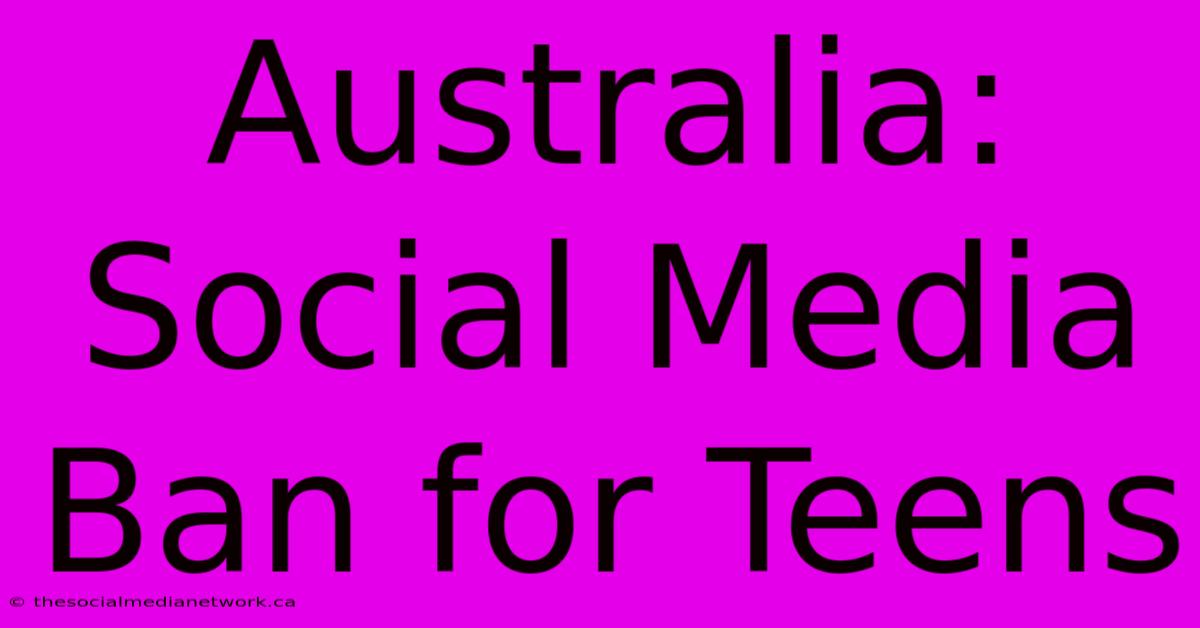Australia: Social Media Ban For Teens

Discover more detailed and exciting information on our website. Click the link below to start your adventure: Visit Best Website meltwatermedia.ca. Don't miss out!
Table of Contents
Australia: Social Media Ban for Teens – A Necessary Step or an Overreach?
Australia is grappling with a complex issue: the potential impact of social media on the mental health of teenagers. This has led to significant discussion, and even proposals, for social media bans for minors. While the idea sparks heated debate, understanding the arguments for and against is crucial. This article delves into the controversy surrounding a potential social media ban for teenagers in Australia, exploring the potential benefits, drawbacks, and alternative solutions.
The Case for a Ban: Protecting Vulnerable Minds
Proponents of a social media ban for teens in Australia cite a growing body of research linking social media use to increased rates of anxiety, depression, body image issues, and cyberbullying. The constant exposure to curated, often unrealistic, portrayals of others' lives can negatively impact self-esteem and mental wellbeing, particularly during the formative teenage years.
Key Arguments for a Ban:
- Mental Health Crisis: The rise in mental health issues amongst young Australians is undeniable, and some believe social media plays a significant role. A ban could potentially mitigate this.
- Cyberbullying: Social media platforms can be breeding grounds for cyberbullying, with devastating consequences for victims. A ban could offer a layer of protection.
- Addiction & Time Management: Excessive social media use can be addictive, leading to decreased academic performance and other issues related to poor time management.
- Data Privacy Concerns: The collection and use of children's data by social media companies raise serious privacy concerns. A ban would limit this exposure.
The Counterarguments: Freedom of Expression and Practical Challenges
Opponents argue that a social media ban is an infringement on freedom of expression and may be impractical to enforce effectively. They also point to the potential for a ban to isolate young people and hinder their access to valuable online resources and communities.
Key Arguments Against a Ban:
- Infringement on Freedom of Speech: A blanket ban restricts teenagers' access to information and their ability to connect with friends and family online.
- Enforcement Difficulties: Monitoring and enforcing a ban across various platforms would be incredibly challenging and resource-intensive.
- Digital Divide: A ban could disproportionately affect disadvantaged youth who rely on social media for access to information and educational resources.
- Lack of Education: Instead of a ban, many argue that a focus on digital literacy education and responsible online behaviour is a more effective approach.
Alternative Solutions: Education, Parental Control, and Platform Accountability
Rather than a complete ban, many experts suggest focusing on alternative strategies. These include:
- Comprehensive Digital Literacy Programs: Equipping teenagers with the skills to navigate social media safely and critically is crucial. This includes identifying misinformation, managing online interactions, and understanding the potential impact of online content.
- Parental Controls and Monitoring: Parents need to be actively involved in monitoring their children's social media use and setting appropriate boundaries.
- Increased Platform Accountability: Social media companies need to take greater responsibility for the content on their platforms, implementing stricter moderation policies and providing better tools for reporting and removing harmful content.
- Improved Mental Health Support: Ensuring easily accessible and comprehensive mental health support services for teenagers is vital, regardless of social media usage.
Conclusion: A Balanced Approach is Necessary
The debate surrounding a social media ban for teenagers in Australia is multifaceted and complex. While the potential benefits of protecting vulnerable young minds are clear, the practical challenges and potential negative consequences of a ban are significant. A balanced approach that prioritizes education, parental involvement, platform accountability, and robust mental health support is likely a more effective and less restrictive solution than a complete ban. The focus should be on empowering young people to use social media responsibly and safely, rather than completely prohibiting access. This requires a collaborative effort involving governments, schools, parents, and social media companies themselves.

Thank you for visiting our website wich cover about Australia: Social Media Ban For Teens. We hope the information provided has been useful to you. Feel free to contact us if you have any questions or need further assistance. See you next time and dont miss to bookmark.
Featured Posts
-
Brady Scouts Knicks Before Giants Game
Nov 29, 2024
-
Virgin Coconut Oil Market 2024 2033
Nov 29, 2024
-
Heidenheim V Chelsea Europa Conference
Nov 29, 2024
-
A330neo Joins Malaysia Aviation Group Fleet
Nov 29, 2024
-
Coconut Oil Cosmetics Market Giants
Nov 29, 2024
